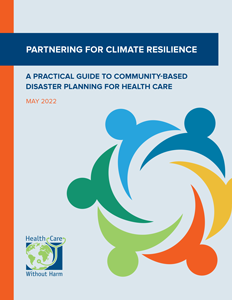Partnering for climate resilience: A practical guide to community-based disaster planning for health care
 Partnering for climate resilience: A practical guide to community-based disaster planning for health care provides a new approach to disaster planning and climate preparedness built on a partnership between health systems and the communities they serve working together to plan for and mitigate the impacts of climate change. The guide provides a playbook and sample materials for health care institutions to partner with emergency planners, public health professionals, and community-based organizations to run a disaster scenario exercise to identify and address vulnerabilities and enable communities to better withstand climate impacts.
Partnering for climate resilience: A practical guide to community-based disaster planning for health care provides a new approach to disaster planning and climate preparedness built on a partnership between health systems and the communities they serve working together to plan for and mitigate the impacts of climate change. The guide provides a playbook and sample materials for health care institutions to partner with emergency planners, public health professionals, and community-based organizations to run a disaster scenario exercise to identify and address vulnerabilities and enable communities to better withstand climate impacts.
This guide is based primarily on lessons learned during the planning, execution, and follow-up to a Department of Homeland Security (DHS)-style “tabletop” disaster preparedness exercise on extreme heat that Health Care Without Harm and our community and health care partners conducted in December 2021 in Springfield, Massachusetts. Participation in that exercise broadened the community’s understanding of needs and concerns and identified support networks that could be mobilized in the event of a climate or other emergency. We intend for this guide’s templates, exercises, resources, and lessons learned to inspire and inform similar efforts by health care systems nationwide.
This practical guide includes:
- An overview of the importance of community-based climate planning you can use to plan your exercise and get buy-in from partners and decision-makers.
- Step-by-step instructions for engaging community partners and running a community-based climate resilience exercise.
- Templates for meeting agendas, invitation lists, presentation decks, scenario modules, framing remarks, and much more.
- Lessons learned from an extreme heat exercise run in Springfield, Massachusetts with a health system and community partners.
